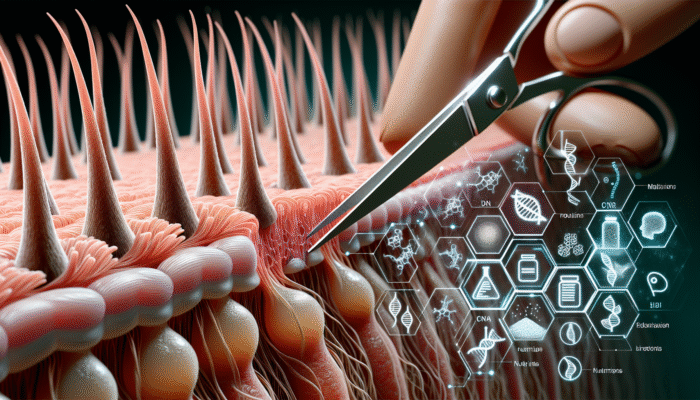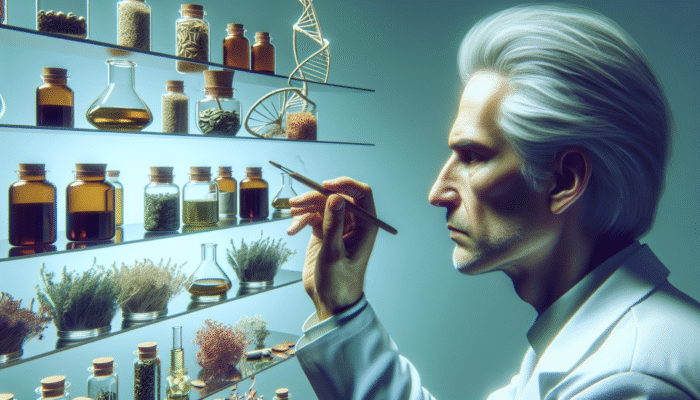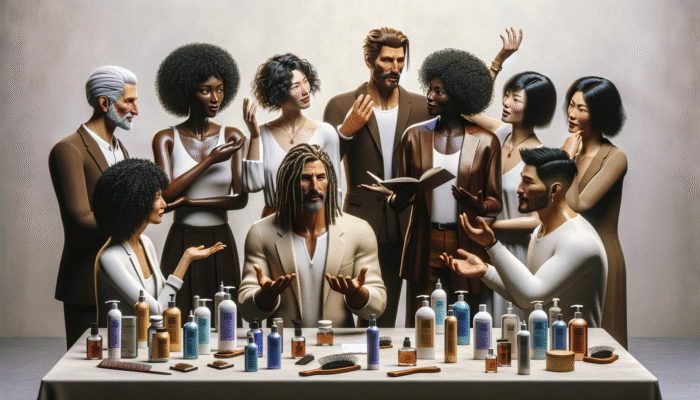Debunking Popular Myths Surrounding Hair Treatments for Healthier Locks
Exploring the Science: Does Cutting Hair Really Boost Growth Speed?

The common notion that cutting hair can dramatically increase its growth rate is a widely held misconception that has permeated beauty culture. By delving deeper into the biological mechanisms that govern hair growth, one uncovers a more complex reality. The true growth of hair originates from hair follicles, which are influenced by numerous factors, including Genetics, overall physical well-being, and hormonal levels. The speed at which hair grows is predominantly dictated by an individual’s genetic traits and dietary habits. Therefore, trimming hair does not impact the fundamental workings of the hair follicles responsible for regulating hair growth speed.
Many individuals mistakenly connect hair trimming with accelerated growth, primarily due to the immediate aesthetic benefits of a freshly cut hairstyle. By removing split ends, hair can appear thicker and healthier, which fosters the illusion that growth has occurred more rapidly. This situation exemplifies a common misunderstanding between correlation and causation; while hair may seem revitalised after a trim, the actual rate of growth remains unchanged. This temporary volume boost can enhance self-esteem, reinforcing the belief that hair grows faster following a cut.
For those eager to promote healthier hair growth, several effective strategies can be adopted. Firstly, embracing a balanced diet abundant in essential vitamins and minerals is vital. Nutrients such as biotin, omega-3 fatty acids, and proteins play critical roles in fostering growth from within. Additionally, prioritising scalp health through gentle massages and the use of suitable hair care products can stimulate the follicles, creating ideal conditions for robust growth. Furthermore, shielding hair from environmental stressors and reducing exposure to excessive heat styling tools is essential for maintaining its vitality and longevity.
Moreover, the psychological benefits associated with regular hair trims can foster a sense of rejuvenation, enhancing the perception of hair health. This emotional response can significantly boost self-confidence, as individuals feel more assured about their appearance. Regular trims can thus be viewed as a proactive step to refresh one’s style, further entrenching the belief that such habits positively influence hair growth. However, it is essential to acknowledge that, according to hair care professionals, while trimming promotes hair health, it does not directly affect the rate of growth or the thickness of hair.
Ultimately, despite the prevalent myth that cutting hair stimulates its growth, it is crucial to recognise that hair growth is primarily governed by genetics, nutritional factors, and overall wellness. Focusing on nutrition and scalp care offers significantly greater benefits for effective hair growth than merely relying on trimming.
Myth Dispelled: Does Washing Hair Frequently Cause Hair Loss?
A common belief held by many is that washing hair too often leads to hair loss, a misconception that has been perpetuated across various communities. In reality, shedding hair is a natural part of the hair growth cycle, with the average person losing between 50 to 100 strands daily. This shedding occurs regardless of how often one washes their hair. Understanding this natural cycle is key to alleviating concerns related to regular washing practices.
The act of shampooing is essential for maintaining scalp health and hygiene. Choosing the right shampoo can efficiently eliminate dirt, oil, and product build-up from styling agents, which, if allowed to accumulate, can lead to scalp issues. It is crucial to select shampoos that cater specifically to your hair type and scalp conditions. For instance, individuals with oily hair may find more frequent washing beneficial, while those with dry or curly hair might require less frequent cleansing to retain essential oils. Opting for gentle and moisturising shampoos is vital for ensuring hair health and keeping the scalp nourished and balanced.
A wealth of research has examined the relationship between shampooing frequency and hair loss. Studies published in the *Journal of Dermatology* have found no significant link between hair loss and how often one shampoos their hair. This contradicts the enduring belief that frequent washing results in increased shedding, reinforcing the understanding that genetics, hormonal fluctuations, and underlying health conditions are the principal factors contributing to hair loss.
To achieve optimal hair health, it is advisable to choose shampoos free from harsh chemicals, such as sulfates and parabens, as these substances can lead to dryness and damage. Additionally, using a suitable conditioner can help retain moisture in the hair, thereby reducing the risk of breakage and enhancing its overall appearance. Balancing washing frequency is crucial; prioritising the needs of your hair and scalp should take precedence over adhering to rigid washing schedules based on myths.
In summary, the belief that frequent shampooing leads to hair loss is unfounded. Highlighting scalp health, selecting appropriate products, and understanding the natural hair growth cycle are far more significant for preserving hair integrity than worrying about shampooing frequency.
Why the Myth of Excessive Brushing for Healthier Hair is Misguided
The notion that brushing hair 100 times a day contributes to healthier strands is an outdated myth rooted in practices from the Victorian era. At that time, it was widely believed that excessive brushing could evenly distribute natural oils, resulting in a lustrous appearance. However, this outdated belief fails to take into account modern hair care knowledge and the potential harm caused by over-brushing.
Over-brushing can be detrimental, especially when hair is wet, as it becomes more susceptible to breakage. Excessive brushing may lead to frayed hair, causing split ends and an unhealthy appearance. Different hair types also dictate the appropriate frequency for brushing. For instance, individuals with fine or delicate hair may find that less frequent brushing is necessary to avoid damage, while those with thicker, coarser hair might tolerate more brushing without significant adverse effects.
Contemporary hair care specialists advocate for a personalised approach to brushing. Rather than adhering to a specific number of strokes, individuals should focus on gentle detangling techniques that minimise breakage. Employing a wide-tooth comb or a brush specifically designed for detangling can significantly lower the risk of damage, particularly for curly or coily hair types. Additionally, using a leave-in conditioner or detangling spray can enhance the brushing process, making it smoother and providing protection to the hair from unnecessary stress.
Expert opinions regarding the myth of excessive brushing indicate a consensus that tailored hair care routines yield far better results than following outdated practices. Dermatologists and trichologists emphasise the importance of understanding individual hair needs, advocating against the one-size-fits-all approach of brushing 100 times. Instead, they recommend developing a brushing routine that nurtures the hair while maintaining its overall health.
In conclusion, the belief that excessive brushing leads to improved hair health is a misconception that overlooks the complexities of modern hair care. The most effective strategy for maintaining healthy, vibrant hair involves practising mindful brushing habits that cater to individual hair types.
Investigating the Myth: Is It Possible to Naturally Reverse Grey Hair?

The belief that grey hair can be reversed through natural remedies is a widespread myth that warrants careful examination. Grey hair occurs as a result of decreased melanin production within hair follicles, a process predominantly driven by genetics and the natural ageing process. Unfortunately, there is currently no scientifically validated natural method to reverse this biological change, and many claims surrounding supplements and home remedies lack substantial scientific backing.
Common misconceptions about grey hair include the idea that stress significantly contributes to this condition. While stress can lead to temporary hair loss, its direct relationship with the greying process remains largely unsubstantiated by scientific research. Studies indicate that genetic predisposition plays a more critical role in determining when and how rapidly an individual experiences greying. Recognising this reality is essential for embracing the natural ageing process and its accompanying changes.
For those grappling with grey hair, embracing this transformation can signify a positive step towards self-acceptance. Many hair care brands are now creating products specifically tailored for grey hair, addressing its unique texture and requirements. These products can enhance the aesthetic appeal of grey hair, providing styling and maintenance options that celebrate rather than conceal silver strands. Accepting grey hair can also serve as a powerful expression of individuality and self-confidence.
While various nutritional supplements—such as vitamin B12 and folic acid—are often touted as potential solutions for reversing grey hair, evidence supporting their effectiveness remains limited. Although these vitamins are essential for maintaining overall hair health, they do not have a direct impact on melanin production. Thus, it is crucial to manage expectations regarding the effects of dietary changes on the appearance of grey hair.
The psychological effects of greying can be profound, influencing self-esteem and mental well-being. Many individuals grapple with societal standards of beauty as they age. Acknowledging that going grey is a natural part of life can foster a healthier relationship with oneself, encouraging a more positive outlook on the ageing journey.
In conclusion, the notion that grey hair can be reversed through natural methods is a myth lacking scientific support. Embracing grey hair with appropriate care and a positive mindset can cultivate greater confidence and self-acceptance as one navigates the complexities of aging.
Are All Natural Hair Care Products Effective for Promoting Healthy Hair?
In recent years, the beauty industry has witnessed a notable surge in the popularity of natural hair care products. However, the term “natural” can often be misleading. Although many consumers assume that natural products are inherently superior for hair health, it is essential to scrutinise the ingredients and their potential effects, as some natural components may actually harm hair.
The definition of “natural” in the context of hair products can vary significantly from one brand to another, and regulatory standards for this classification are frequently inconsistent. Ingredients derived from nature are not automatically safe; for example, some essential oils may cause scalp irritation or allergic reactions. Therefore, consumers must carefully examine product labels and understand the implications of the ingredients they apply to their hair. Prioritising the efficacy of specific components—rather than solely their natural origin—can lead to more informed product choices.
When evaluating hair care products, it is beneficial to consider individual hair types and specific concerns. For instance, individuals with curly hair may prefer products enriched with natural oils for added moisture, while those with fine hair might require lightweight formulations that do not weigh their hair down. The key lies in selecting products that cater to personal hair needs instead of merely following trends based on the allure of the “natural” label.
Moreover, many synthetic ingredients have been scientifically formulated to provide benefits that may not be achievable with natural alternatives. For example, silicone, despite being synthetic, can offer excellent heat protection and smoothness, making it effective for various hair styling requirements. Understanding the diverse roles of different ingredients and their performance can assist in making choices that prioritise hair health and desired outcomes.
In summary, while the allure of “natural” hair products is understandable, it is crucial to approach this trend with a discerning mindset. Evaluating the ingredients and their suitability for your hair type is far more important than simply opting for products based on the appeal of being “natural.”
Does Hair Dye Contribute to Thinning Hair?
The belief that hair dye contributes to hair loss is a common concern among those who enjoy changing their hair colour. While it is true that hair dye can potentially damage the hair shaft, it does not directly cause hair loss. Understanding this distinction is crucial for anyone looking to enhance their appearance through colour treatments.
Hair dye alters the natural structure of hair, which can lead to dryness and brittleness. This damage is often exacerbated when harsh chemical dyes or improper dyeing techniques are employed. However, the actual impact on hair loss is relatively minor. Strands may appear thinner or seem to fall out due to breakage, but this should be distinguished from the loss of hair follicles.
Following safe hair dyeing practices is essential to minimise potential damage from hair dye. This includes performing patch tests to avoid allergic reactions and using specially formulated products designed to reduce harm. Preparing the hair prior to dyeing, such as through deep conditioning treatments, can strengthen strands, making them less prone to the harsh effects of dye. Furthermore, considering alternative methods, such as semi-permanent dyes or natural options like henna, can be effective for achieving colour without exacerbating damage.
For those concerned about hair health while colouring, consulting a professional stylist can provide valuable guidance on the best methods and products, ensuring that the dyeing process is both safe and effective. Regular trims can also assist in maintaining hair integrity, reducing the appearance of damage and promoting healthier growth.
In conclusion, while hair dye can cause some level of damage to the hair itself, it does not directly lead to hair loss. By employing safe dyeing techniques and making informed product choices, individuals can enjoy the aesthetic benefits of hair colour without compromising the overall health of their hair.
Your Comprehensive Guide to Hair Care and Treatments: Essential Questions Answered

Does trimming my hair affect its growth rate?
No, trimming hair does not influence its growth rate. Hair growth occurs at the follicle level and is primarily determined by genetics and overall health, rather than the frequency of haircuts.
Is washing my hair daily unhealthy?
Washing hair daily may not be necessary for all individuals. It significantly depends on hair type; those with oily hair may benefit from daily cleansing, while people with dry or curly hair might need to wash less frequently to maintain moisture.
How often should I brush my hair for optimum health?
The frequency of brushing is contingent on hair type. Properly detangling once or twice daily is generally sufficient; excessive brushing should be avoided to prevent breakage and damage.
Can grey hair revert to its original colour?
Currently, there are no scientifically validated methods to reverse grey hair naturally. Grey hair results from genetic factors and a decline in melanin production.
Are natural hair products always the best choice for my hair?
Not necessarily. While natural products can provide benefits for hair, some natural ingredients may be harsh. It is essential to evaluate ingredients and their effects based on individual hair types and needs.
Does hair dye contribute to thinning hair?
Hair dye can damage the hair shaft, causing breakage that may lead to the appearance of thinning hair. However, it does not directly result in hair loss from the follicles.
Are there specific foods that support hair growth?
Foods rich in vitamins A, C, D, E, zinc, iron, and omega-3 fatty acids are beneficial for hair growth. A balanced diet can significantly enhance overall hair health and stimulate growth.
Is stress a major factor in greying hair?
While stress can lead to temporary hair loss, its direct link to greying hair is largely unsupported. Genetics plays a more significant role in determining when and how quickly hair greys.
Should I stop shampooing if my hair is thinning?
No, refraining from shampooing is not necessary. Instead, focus on using gentle, suitable products that maintain scalp health, which can help support hair vitality and strength.
How can I enhance the condition of my dyed hair?
To keep dyed hair healthy, use colour-safe shampoos and conditioners, minimise heat styling, and incorporate regular deep conditioning treatments to nourish and protect the hair.
Connect with Us on Facebook for More Insightful Hair Care Tips!
The Article: Common Hair Treatment Myths Debunked: Unveiling the Truth appeared first on Amitys Hair Salon.
The Article Hair Treatment Myths Debunked: Discover the Truth Was Found On https://limitsofstrategy.com
The Article Hair Treatment Myths: Uncovering the Real Truth found first on https://electroquench.com

